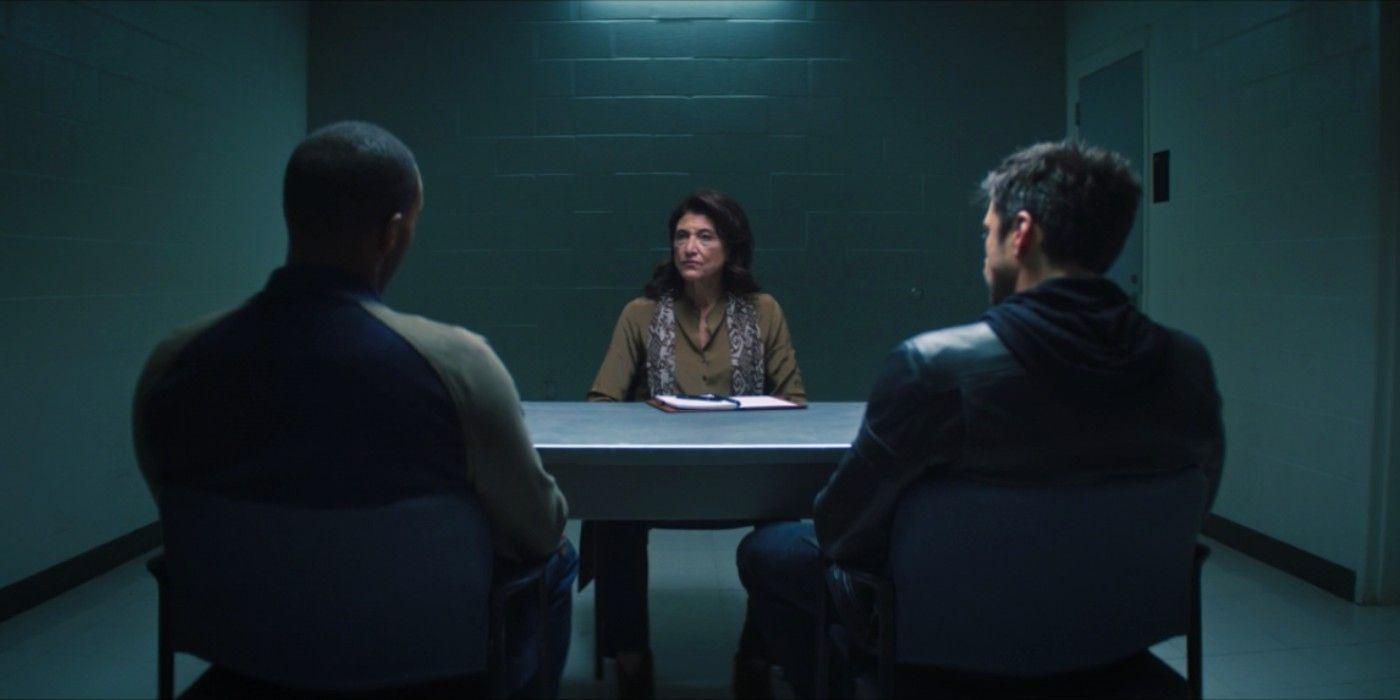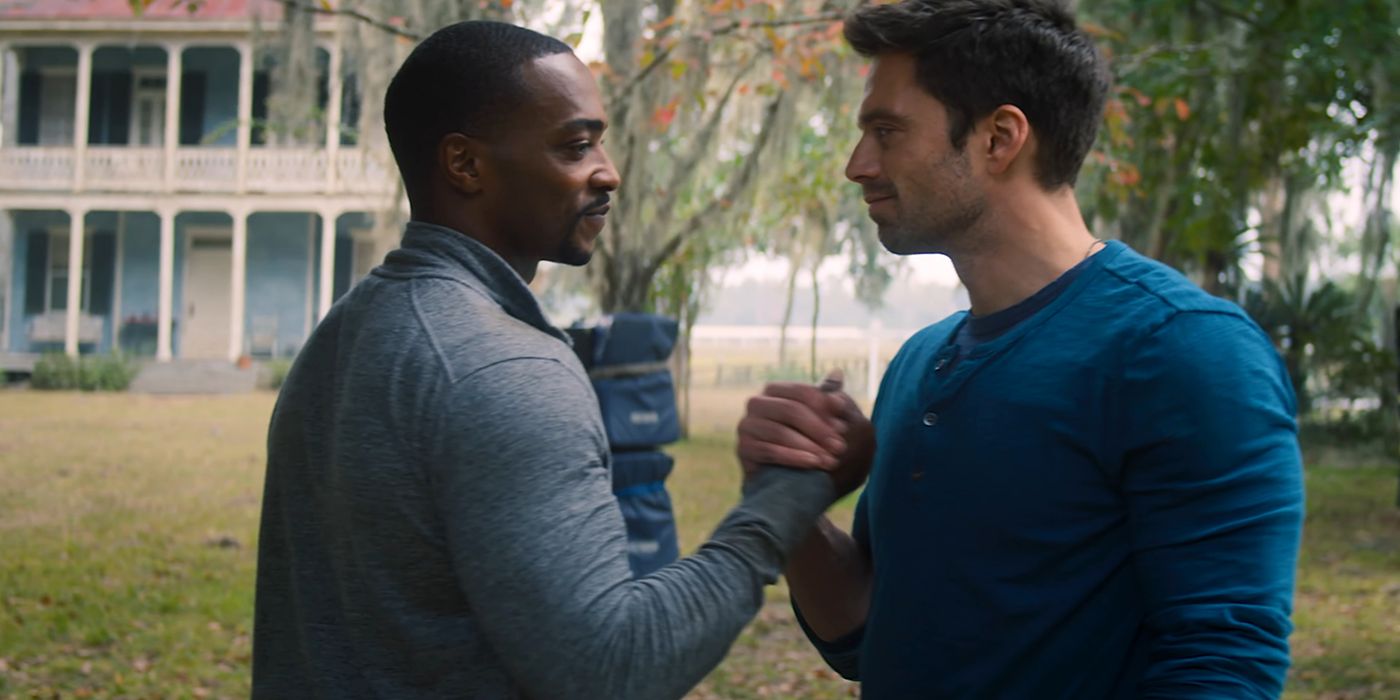
Screen Rant recently spoke with The Falcon And the Winter Soldier‘s Amy Aquino, who had a lot to say about the fact that the MCU is diving deeper into the conversation surrounding mental health. Over the past 10+ years that the MCU has been around, the franchise has made some references to mental health; for example, viewers saw Tony Stark (Robert Downey Jr.) have a panic attack in Iron Man 3. That said, the topic has often been incorporated as a supporting plot point, rather than the main focus of the project.
That all changed with MCU’s release of WandaVision on Disney+. The series certainly propelled the story forward, and it featured the obligatory battle between Wanda (Elizabeth Olsen) and her adversary, Agatha Harkness (Kathryn Hahn). But unlike any other MCU project before it, WandaVision was mainly a meditation on grief, loneliness, denial, and all the other complicated emotions which arise when losing a loved one (in this case, Paul Bettany’s Vision). It appears that the MCU is continuing this conversation about mental health, this time by exploring PTSD through the experiences of Bucky Barnes (Sebastian Stan) and Sam Wilson (Anthony Mackie) in Falcon and the Winter Soldier.
Rather than building up to the themes like in WandaVision, The Falcon And the Winter Soldier went straight into portraying PTSD in its first episode. The pilot episode saw Bucky speaking with Dr. Raynor (Aquino), his court-mandated therapist who is helping him work through his trauma and make amends with the long list of people he has affected. In an exclusive conversation with Aquino, the actress spoke about the importance of addressing mental health, saying it is just as important as our physical health. Continue below to see Aquino’s full comment:
It seems to me that the Marvel Universe is moving more in this direction of being more contemplative and wanting to delve deeply into what’s going on underneath. What’s going on with these people? Because they are people. They’re not just robots; they’re not just wizards. They are people who happen to have superpowers. And I think it goes along the lines of what they are doing with Sam’s character, showing him at home with the family business; showing him being the one when the cops come up and think there’s something going wrong. They assume that he’s the perpetrator there.
So, I think it’s fascinating and really helpful that they’re going in this direction, because the Marvel product has such a wide influence. I think it’s wonderful and could be very helpful in terms of mental health, too – and the acceptance of mental health as just part of your health. You get your physical health, you get your mental health. One is not more embarrassing than the other. They’re the same.
The Marvel Universe is saying, ‘Okay, this guy’s got a superpower, but he also has these real issues that you’ve seen him develop.’ Nobody goes through what he did without being wounded; dramatically wounded, and he needs help. And he has to actually do the work in order to get healed.

The Falcon and the Winter Soldier has already fully opened the door to this conversation about PTSD with its first two episodes, and it appears that they won’t let up on this discussion anytime soon. Showrunner, Malcolm Spellman, has promised an emotional climax in episode 5, which strongly suggests that fans will get a close-up into what the characters have been feeling post-Blip. With the latest introduction of history’s forgotten Captain America (Carl Lumbly), it appears that the show will have plenty of opportunities to dive into trauma, PTSD, how it can affect everyone differently, and – most importantly – what a person can do to cope.
As Aquino mentions, Falcon and the Winter Soldier is also tackling the topic of systemic racism. Episode 2 included a scene in which a cop automatically assumes Sam is bothering Bucky – an experience that is unfortunately far too common for Black people in America. This type of social commentary will likely pop-up again as the series continues, especially if Sam finally takes up Cap’s shield.
Of course, the MCU likes to balance out the serious moments with humor and charm. For The Falcon and the Winter Soldier, this balance can happen, thanks to Mackie and Stan’s impressive comedic talents and their clear chemistry. Although Bucky and Sam have a complicated relationship, it already seems like the two are warming up to each other, and their banter during that process has been entertaining to watch. In short, fans don’t have to worry about losing any of the action or wit that comes with Marvel projects. But now, fans will also have the opportunity to learn more about their own mental health through the lens of the superheroes and their experiences, which, as Aquino said, is extremely important. After all, we all need to “actually do the work in order to get healed,” and superhero stories can help us do that.
Originally from https://screenrant.com/falcon-winter-soldier-amy-aquino-mcu-mental-health/
